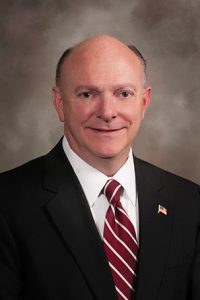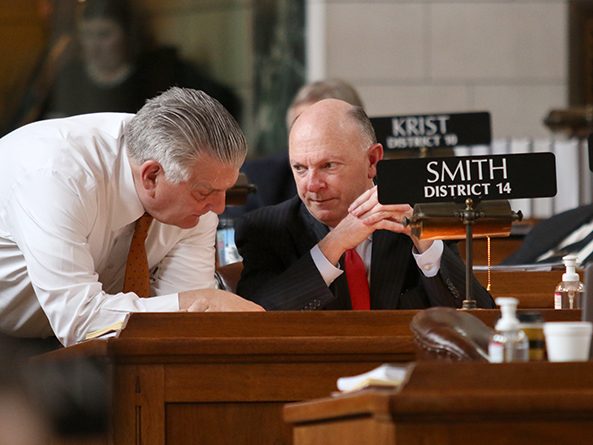Tax cuts, new ag land valuation method debated
The Legislature debated a bill April 21 that would change the way agricultural land is assessed and cut the state’s top income and corporate tax rates if projected state revenue growth meets certain targets.

As introduced by Sen. Jim Smith of Papillion, LB461 proposed a technical change to state tax law. A Revenue Committee amendment would replace the bill and incorporate provisions from several other bills, including:
- LB338, introduced by Bancroft Sen. Lydia Brasch on behalf of Gov. Pete Ricketts, which would change the state’s method for valuing agricultural and horticultural land to an income-based approach;
- LB337, introduced by Smith also on behalf of the governor, which would use economic growth rates to trigger income tax cuts; and
- LB452, introduced by Omaha Sen. Brett Lindstrom, which would change income tax rates and personal exemption amounts.
Smith said the proposed tax cuts would grow the state’s economy by helping Nebraska compete with its neighbors when attracting and retaining businesses and workers. Changing the state’s method of valuing agricultural land would, over the long term, help to relieve the disproportionate burden of property taxes on farmers and ranchers, he added.
“We have a tax problem in the state,” Smith said. “The answer is not simple and can only be found through a compromised and consistent effort. And it must be both reasonable and affordable to meet the standards of Nebraska’s businesses and Nebraska’s citizens.”
The bill would collapse the bottom two personal income tax brackets — with rates of 2.46 percent and 3.51 percent, respectively — into one bracket, which would pay a rate of 3.25 percent, in 2019. The bill also would decrease the state’s top corporate income tax rate from 7.81 percent to 7.59 percent that year.
To help pay for those cuts, the bill would eliminate income tax exemptions for some high earners, Smith said. LB461 also would suspend two tax credit programs: the New Markets Job Growth Investment Act and the Nebraska Job Creation and Mainstreet Revitalization Act.
Nebraska’s top individual income tax rate would be reduced in eight increments by roughly 0.1 percent per year beginning in 2020 if the expected rate of revenue growth from year to year exceeds 3.5 percent. Assuming cuts were triggered every year, the rate would drop from 6.84 percent in 2020 to 5.99 percent in 2027, for a total reduction of 0.85 percent.
The bill would give tax credits to low-income earners and increase the earned income tax credit from the current 10 percent to 11 percent in 2019 and 12 percent in 2020.
Also beginning in 2020, the bill would reduce the top corporate income tax rate by 0.2 percent per year if the projected rate of state revenue growth exceeds 4 percent for the next fiscal year. The cuts would continue until the rate reaches 5.99 percent.
Beginning in 2018, agricultural and horticultural land would be assessed using an income-based approach instead of the current market value approach.
A new committee led by the state tax commissioner would establish capitalization rates for each class of agricultural or horticultural land, including irrigated cropland, dryland cropland, grassland used for grazing, grassland use for haying, wasteland, nurseries, feedlots and orchards.
The committee would ensure that aggregate agricultural use value for each class of land is between 55 and 65 percent of the actual value and the bill would cap annual growth in aggregate agricultural use value at 3.5 percent.
Brasch supported the proposal, saying that income-based valuations would better reflect farmers’ ability to pay their taxes and provide them some relief from the high property taxes they have paid in the last decade due to increasing valuations. Income-based valuation methods — which are used in nine other states, including Nebraska’s neighbors — are tried and sound, she said.
“Had it been done 10 years ago, we wouldn’t be standing here in this situation today,” Brasch said.
Venango Sen. Dan Hughes also supported the bill, although he said he is concerned that the proposed valuation method relies on an arbitrary capitalization rate set by a committee. Even though LB461 is not perfect, he said, it would provide needed relief to the state’s agriculture industry.
“Right now, property taxes are killing our No. 1 industry,” Hughes said.
Sen. Burke Harr of Omaha opposed the bill, saying that a recent report commissioned by the state Department of Economic Development recommended that the Legislature focus on improving education, health care, housing and workforce development for economic growth. It did not recommend tax cuts, he said.
“Do you really think that’s going to drive [growth]?” Harr said. “Or do we want to be focused like a laser and say we want to incentivize high-demand, high-skill, high-wage jobs?”
Lincoln Sen. Kate Bolz also spoke against LB461, saying that it would be financially irresponsible to tie income tax cuts to projected growth rather than actual growth.
“Revenue projections are more art than science some years,” she said. “In fact, we rarely get it close to target.”
Bolz said the proposed triggers would have cut income taxes in 2002 when the state faced a $750 million shortfall and again in 2008 when the shortfall reached $377 million.
Also in opposition to the bill was Sen. Patty Pansing Brooks of Lincoln. She said she would be in favor of the proposed tax cuts if the state were not facing a large budget shortfall and if the cuts would not disproportionately benefit wealthy Nebraskans.
“I do appreciate the fact that Sen. Smith is trying to add the [earned income tax credit] in … but in relation to what’s happening to the wealthy people, it’s a crumb,” Pansing Brooks said.
Sen. Bob Krist of Omaha said he is concerned about the complexity of the proposal and that it could shift the tax burden from agricultural landowners to residential and commercial taxpayers.
“My biggest concern is the shift in tax to our residential areas,” he said. “In some of your small towns, in some of your counties, there is nothing to shift to.”
Krist filed a motion to recommit the bill to the Revenue Committee for additional work, saying that a vote on the motion could be seen as a test of the bill’s support. The motion failed 15-29. Thirty-three supporters are needed to break a filibuster of the bill.
Lawmakers adjourned for the week before taking further votes. Several amendments are pending.


